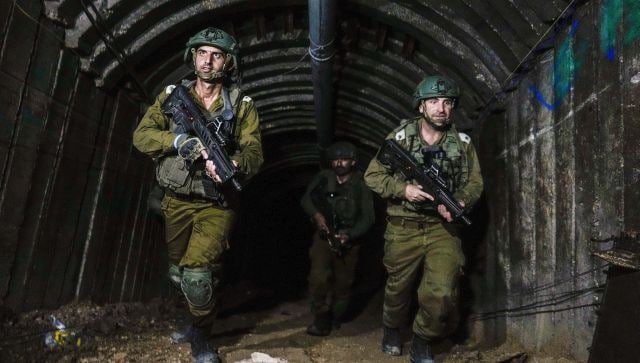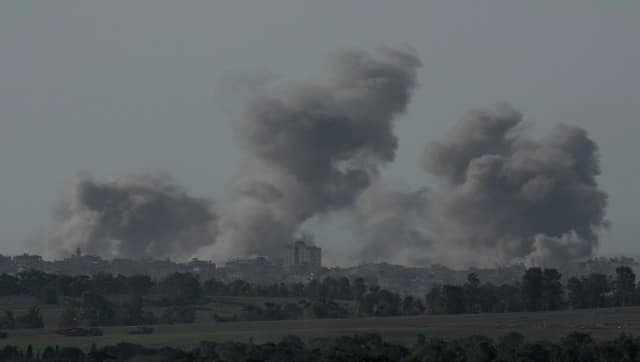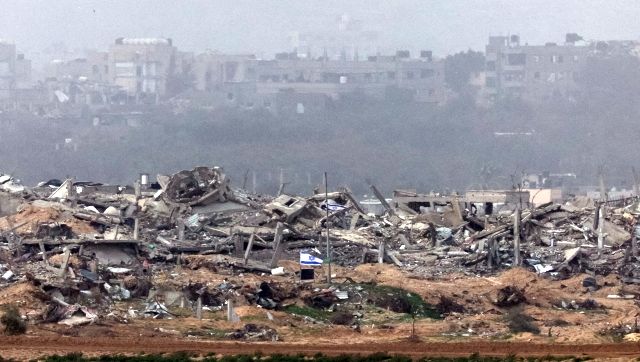The death of an IDF soldier from fungal infection in Gaza has alarmed many experts and thrown the spotlight on the increased risk of diseases spreading in war zones. The soldier, whose identity remains unknown, succumbed to the infection after being hospitalised. Meanwhile, several other Israeli soldiers are battling drug-resistant infections and the World Health Organisation has warned that the healthcare system in Gaza is on the verge of collapse amid Israel’s bombings. But what happened? And how bad could things get? Let’s take a closer look: What happened? The soldier was brought to Assuta Ashdod Medical Center two weeks ago, according to Kan public broadcaster. The soldier, who suffered severe limb injuries, was given around-the-clock treatment. Israel’s Ynet news website, doctors attempted to cure the soldier with a variety of treatments including experimental ones. They also brought in specialists.
However, the fungus spread through the soldier’s body and ultimately killed him.
As per Jerusalem Post, at least 10 other soldiers have been diagnosed with infections. As per The Messengers, doctors think the soldiers caught the infections from the soil in Gaza. Constant bombardment by Israeli forces has left the ground covered by sewage and other pollutants. Professor Eyal Leshem, an infectious diseases expert at Israel’s Sheba Medical Center told the website, “Some of the wounded in Gaza are exhibiting complex infections which are the result of conditions on the ground.” The Telegraph UK quoted the Association for Infectious Diseases (AID) in Israel as saying that drug-resistant pathogens have been found mostly in limb injuries of soldiers. [caption id=“attachment_13515692” align=“alignnone” width=“640”] Doctors think the soldiers caught the infections from the soil in Gaza. AP[/caption] These include highly resistant bacterial strains of Klebsiella and Escherichia coli, and Aspergillus fungi. AID chairman professor Galia Rahav told the newspaper, “In all hospitals it is reported that soldiers have returned from the battlefield with resistant infections.” “It should be noted that a large part of the infections diagnosed among the wounded soldiers are also discovered from time to time in Israel, but they are found in people who were exposed to these bacteria, and not before.” “The contact with the soil and mud there causes exposure to such resistant bacteria, and also to mould.” This isn’t a new phenomenon either. As per the newspaper, the war in Iraq saw wounded US soldiers take the superbug Acinetobacter Baumannii back to US hospitals. “Just to be clear — the injured IDF soldiers are not being treated in Gaza hospitals. They are picking up these infections because these bacteria, fungi, or parasites are in the dirt or mud in Gaza where they are lying until they are evacuated. They have deep, open wounds that the microbes infect,” professor Nadav Davidovitch, an epidemiologist who heads Ben-Gurion University of the Negev’s School of Public Health, told Times of Israel. What happens next? Experts say Gaza is a perfect breeding ground for a possible epidemic. A lack of food, clean water and shelter have worn down hundreds of thousands of traumatised people and, with a health system on its knees, it’s inevitable epidemics will rip through the enclave, 10 doctors and aid workers told Reuters. “The perfect storm for disease has begun. Now it’s about, ‘How bad will it get?’” James Elder, chief spokesperson for the UN children’s fund (UNICEF), said in an interview.
Doctors think the soldiers caught the infections from the soil in Gaza. AP[/caption] These include highly resistant bacterial strains of Klebsiella and Escherichia coli, and Aspergillus fungi. AID chairman professor Galia Rahav told the newspaper, “In all hospitals it is reported that soldiers have returned from the battlefield with resistant infections.” “It should be noted that a large part of the infections diagnosed among the wounded soldiers are also discovered from time to time in Israel, but they are found in people who were exposed to these bacteria, and not before.” “The contact with the soil and mud there causes exposure to such resistant bacteria, and also to mould.” This isn’t a new phenomenon either. As per the newspaper, the war in Iraq saw wounded US soldiers take the superbug Acinetobacter Baumannii back to US hospitals. “Just to be clear — the injured IDF soldiers are not being treated in Gaza hospitals. They are picking up these infections because these bacteria, fungi, or parasites are in the dirt or mud in Gaza where they are lying until they are evacuated. They have deep, open wounds that the microbes infect,” professor Nadav Davidovitch, an epidemiologist who heads Ben-Gurion University of the Negev’s School of Public Health, told Times of Israel. What happens next? Experts say Gaza is a perfect breeding ground for a possible epidemic. A lack of food, clean water and shelter have worn down hundreds of thousands of traumatised people and, with a health system on its knees, it’s inevitable epidemics will rip through the enclave, 10 doctors and aid workers told Reuters. “The perfect storm for disease has begun. Now it’s about, ‘How bad will it get?’” James Elder, chief spokesperson for the UN children’s fund (UNICEF), said in an interview.
The World Health Organisation in November had issued a dire warning to the world.
“Given the living conditions and lack of health care, more people could die from disease than bombings,” WHO director-general Dr Tedros Adhanom Ghebreyesus wrote on X. From 29 November to 19 December, cases of diarrhoea in children under five jumped 66 per cent to 59,895 cases, and climbed 55 per cent for the rest of the population in the same period, according to data from the World Health Organization (WHO). The UN agency said the numbers were inevitably incomplete due to the meltdown of all systems and services in Gaza because of the war. The head of the paediatric ward at Nasser Hospital in Khan Younis in southern Gaza, Dr. Ahmed Al-Farra, told Reuters on Tuesday his ward was overrun with children suffering extreme dehydration, causing kidney failure in some cases, while severe diarrhoea was four times higher than normal. He said he was aware of 15 to 30 cases of Hepatitis A in Khan Younis in the past two weeks: “The incubation period of the virus is three weeks to a month, so after a month there will be an explosion in the number of cases of Hepatitis A.” Since the truce between Israel and Hamas collapsed on 1 December, hundreds of thousands of people have moved to makeshift shelters - abandoned buildings, schools and tents. Many others are sleeping in the open with little access to toilets or water to bathe, aid workers said. [caption id=“attachment_13548912” align=“alignnone” width=“640”] Smoke rises following an Israeli bombardment in the Gaza Strip, as seen from southern Israel. AP[/caption] At the same time, 21 of the Gaza Strip’s 36 hospitals are closed, 11 are partially functional and four are minimally functional, according to WHO figures from 10 December. Marie-Aure Perreaut, emergency medical coordinator for MSF’s operations in Gaza, said the medical charity had left a health centre in Khan Younis 10 days ago - because the area was within Israel’s evacuation orders - where it had been treating respiratory tract infections, diarrhoea and skin infections, She said two things were now inevitable. “The first is an epidemic of something like dysentery will spread across Gaza, if we continue at this pace of cases, and the other certainty is that neither the ministry of health nor the humanitarian organisations will be able to support the response to those epidemics,” she said. ‘Diseases don’t have borders’ The Times of Israel quoted civilian experts as saying that such cases are less isolated than has been reported. Davidovitch said every Israeli hospital has reported a substantial percentage of wounded soldiers having serious antimicrobial-resistant infections. This, naturally, raises worries about infections spreading in Israel.
Smoke rises following an Israeli bombardment in the Gaza Strip, as seen from southern Israel. AP[/caption] At the same time, 21 of the Gaza Strip’s 36 hospitals are closed, 11 are partially functional and four are minimally functional, according to WHO figures from 10 December. Marie-Aure Perreaut, emergency medical coordinator for MSF’s operations in Gaza, said the medical charity had left a health centre in Khan Younis 10 days ago - because the area was within Israel’s evacuation orders - where it had been treating respiratory tract infections, diarrhoea and skin infections, She said two things were now inevitable. “The first is an epidemic of something like dysentery will spread across Gaza, if we continue at this pace of cases, and the other certainty is that neither the ministry of health nor the humanitarian organisations will be able to support the response to those epidemics,” she said. ‘Diseases don’t have borders’ The Times of Israel quoted civilian experts as saying that such cases are less isolated than has been reported. Davidovitch said every Israeli hospital has reported a substantial percentage of wounded soldiers having serious antimicrobial-resistant infections. This, naturally, raises worries about infections spreading in Israel.
“Diseases don’t have borders. We need to take this situation seriously,” warned Davidovitch.
“If the war continues, there will be more and more interaction between soldiers and the local community in the coming weeks and months. I don’t see any other way, because a situation of two million people in a humanitarian disaster will need to be managed,” Davidovitch said. “That will definitely lead to more opportunities for the infection of IDF troops and their bringing those infections home to Israel. We, as public health officials, are thinking and planning about this, and the IDF needs to, as well,” he added. As per Jerusalem Post, the Israeli Society for Infectious Diseases will meet epidemiological experts from the IDF and the health ministry next week. The meeting will also see deliberations being held about whether Hamas’ tunnels are the origin of the infections. “That is why we are extremely worried about the infected wounded of hostages who remain in captivity,” added professor Hagai Levine, a noted Israeli epidemiologist and medical representative for the hostage families. “Which emphasizes the understanding that it is necessary to release the hostages and bring them back to Israel for treatment as soon as possible.” With inputs from agencies
)